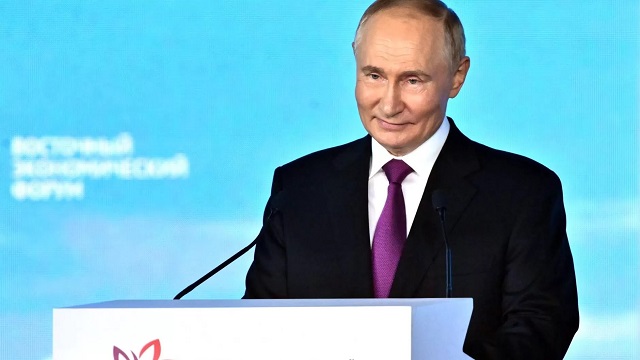International
Why You Shouldn’t Fret Much Over Russian Election Interference

From The Rattler
By J.D. Tuccille
Governments are always screwing with other countries politics. It’s often ineffective.
If you missed the news, Russians are interfering in American politics again. If you missed history, Russians are always interfering in other countries’ politics—and so is everybody else, including the U.S. Screwing around with foreign elections is a popular sport for the world’s regimes, though it’s not clear that websites, bogus social media accounts, and funds funneled to a political-commentary network will return more bang for Putin’s rubles than did past social media shenanigans.
Russia, Again
“The Justice Department today announced the ongoing seizure of 32 internet domains used in Russian government-directed foreign malign influence campaigns colloquially referred to as ‘Doppelganger,’ in violation of U.S. money laundering and criminal trademark laws,” according to a September 4 government press release. “In conjunction with the domain seizures, the U.S. Treasury Department announced the designation of 10 individuals and two entities as part of a coordinated response to Russia’s malign influence efforts targeting the 2024 U.S. presidential election.”
The indictment specified “the defendants, have deployed nearly $10 million, laundered through a network of foreign shell entities, to covertly fund and direct U.S. Company-I [which] publishes English-language videos on multiple social media channels, including TikTok, Instagram, X, and YouTube.”
“Many of the videos published by U.S. Company-I contain commentary on events and issues in the United States, such as immigration, inflation, and other topics related to domestic and foreign policy,” adds the indictment. “While the views expressed in the videos are not uniform, the subject matter and content of the videos are often consistent with the Government of Russia’s interest in amplifying U.S. domestic divisions in order to weaken U.S. opposition to core Government of Russia interests, such as its ongoing war in Ukraine.”
Based on details in the indictment, Company-1 has been identified as Tenet Media (since shuttered), which managed a stable of right-wing pundits including Lauren Southern, Tim Pool, Taylor Hansen, Matt Christiansen, Dave Rubin, and Benny Johnson. The company promoted, the indictment says, “nearly 2,000 videos that have garnered more than 16 million views on YouTube alone.”
Very nefarious, right? Well, maybe not. While Tenet founder Lauren Chen has gone quiet and lost her gig with Blaze TV and channels on YouTube, Tenet’s contributors seem baffled by the whole thing.
“The Culture War Podcast was licensed by Tenet Media, it existed well before any license agreement with Tenet and it will continue to exist after any such agreement expires,” insists Tim Pool. “Never at any point did anyone other than I have full editorial control of the show.”
Benny Johnson also says, “I am the only person who ever had editorial control of my program.”
Translated Russian documents outlining a “guerilla media campaign in the United States” caution their intended audience that “in the United States there are no pro-Russian and/or pro-Putin mainstream politicians or sufficiently large numbers of influencers and voters. There is no point of justifying Russia and no one to justify it to.” The campaign was meant to exploit “the high level of polarization of American society” by paying commentators to say things they were already saying.
It’s not clear they got a lot of mileage from that program.
Not a Lot of Bang for the Ruble
“Numbers like those might sound impressive,” independent journalist Ken Klippenstein wrote of the Tenet pundits drawing 16 million YouTube views after receiving $10 million. “But my Twitter analytics informs me that over the past year, my posts garnered 463 million views. So Russia’s dastardly scheme reached a small fraction of the people my dumbass posts do.”
That’s typical for foreign meddling in our already messy domestic politics.
“It would appear unlikely that the Russian foreign influence campaign on Twitter could have had much more than a relatively minor influence on individual-level attitudes and voting behavior,” concluded a 2023 analysis of Russian interference in the 2016 election published in the journal Nature Communications. The authors added, “we did not detect any meaningful relationships between exposure to posts from Russian foreign influence accounts and changes in respondents’ attitudes on the issues, political polarization, or voting behavior.”
In 2020, foreign influencers worked against each other, including supposed allies in the latest Axis of Evil. A 2021 report from the government’s National Intelligence Council, which reports to the Office of the Director of National Intelligence (ODNI), found “Russian President Putin authorized, and a range of Russian government organizations conducted, influence operations aimed at denigrating President Biden’s candidacy and the Democratic Party” while “Iran carried out a multi-pronged covert influence campaign intended to undercut former President Trump’s reelection prospects.” Also meddling were forces including “Lebanese Hizballah, Cuba, and Venezuela.”
This sort of sounds like a cost-effective means of funding U.S. elections—just let foreign intelligence operations pay for them. But the ODNI report cautioned these schemes “undermine public confidence in the electoral process and US institutions, and sow division and exacerbate societal tensions in the US.” Which means getting us upset and pointing fingers about foreign interference is a goal of these schemes.
The same can almost certainly be said when U.S. agencies join the fun.
Election Interference Is a Game the U.S. Also Plays
“I was alarmed in 2016 by how policymakers and commentators frequently described Russian interference in our election as unprecedented,” according to the Wilson Center’s David Shimer, who wrote Rigged (2020) on the topic. “Many former CIA officers told me in interviews that they viewed the ’48 operation in Italy as the agency at its best. And in the aftermath of that operation, as the CIA’s chief internal historian put it to me, the agency and the KGB went toe to toe in elections all over the world.”
The National Endowment for Democracy, founded by Congress in 1983, is “dedicated to fostering the growth of a wide range of democratic institutions abroad, including political parties, trade unions, free markets and business organizations.” It does so through “grants to support the projects of non-governmental groups abroad.” I find the NED and its goals less troublesome than those of Russians funding U.S. political pundits, but I bet lots of people elsewhere disagree. Fundamentally, it’s all part of the same international contest to screw with the internal debates of allies and adversaries alike.
So, take reports of Russian interference in American elections with a grain of salt, knowing that Putin is paying Americans to say what they already believe, and the U.S. does the same in other countries. Importantly, none of that interference prevents you from making your own decisions.
|
|
Health
Canada surrenders control of future health crises to WHO with ‘pandemic agreement’: report

From LifeSiteNews
Canada’s top constitutional freedom group warned that government officials have “relinquished” control over “future health crises” by accepting the terms of the World Health Organization’s (WHO) revised International Health Regulations (IHR).
The warning came in a report released by the Justice Centre for Constitutional Freedoms (JCCF). The group said that Prime Minister Mark Carney’s acceptance earlier this year of the WHO’s globalist-minded “pandemic agreement” has “placed Canadian sovereignty on loan to an unelected international body.”
“By accepting the WHO’s revised IHR, the report explains, Canada has relinquished its own control over future health crises and instead has agreed to let the WHO determine when a ‘pandemic emergency’ exists and what Canada must do to respond to it, after which Canada must report back to the WHO,” the JCCF noted.
The report, titled Canada’s Surrender of Sovereignty: New WHO health regulations undermine Canadian democracy and Charter freedoms, was authored by Nigel Hannaford, a veteran journalist and researcher.
The WHO’s IHR amendments, which took effect on September 19, are “binding,” according to the organization.
As reported by LifeSiteNews, Canada’s government under Carney signed onto them in May.
Hannaford warned in his report that “(t)he WHO has no legal authority to impose orders on any country, nor does the WHO possess an army, police, or courts to enforce its orders or regulations.”
“Nevertheless, the WHO regards its own regulations as ‘an instrument of international law that is legally binding on 196 countries, including Canada” he wrote.
Hannaford noted that “Surrendering Canada’s sovereignty” to the IHR bodies is itself “contrary to the constitutional principle of democratic accountability, also found in the Canadian Charter of Rights and Freedoms.”
“Canada’s health policies must reflect the needs, desires, and freedoms of Canadians – not the mandates of distant bureaucrats in Geneva or global elites in Davos. A free and democratic Canada requires vigilance and action on the part of Canadians. The time to act is now” he wrote.
Among the most criticized parts of the agreement is the affirmation that “the World Health Organization is the directing and coordinating authority on international health work, including on pandemic prevention, preparedness and response.”
While the agreement claims to uphold “the principle of the sovereignty of States in addressing public health matters,” it also calls for a globally unified response in the event of a pandemic, stating plainly that “(t)he Parties shall promote a One Health approach for pandemic prevention, preparedness and response.”
Constitutional lawyer Allison Pejovic noted that “(b)y treating WHO edicts as binding, the federal government has effectively placed Canadian sovereignty on loan to an unelected international body.”
“Such directives, if enforced, would likely violate Canadians’ Charter rights and freedoms,” she added.
Hannaford said that “Canada’s health policies must be made in Canada.”
“No free and democratic nation should outsource its emergency powers to unelected bureaucrats in Geneva,” he wrote.
The report warned that new IHR regulations could mandate that signatory nations impose strict health-related policies, such as vaccine mandates or lockdowns, with no “public accountability.”
“Once the WHO declares a ‘Pandemic Emergency,’ member states are obligated to implement such emergency measures ‘without delay’ for a minimum of three months,” the JCCF said.
“Canada should instead withdraw from the revised IHR, following the example of countries like Germany, Austria, Italy, the Czech Republic, and the United States,” the JCCF continued. “The report recommends continued international cooperation without surrendering control over domestic health policies.”
Earlier this year, Conservative MP Leslyn Lewis condemned the Liberal government for accepting the WHO’s IHR.
Digital ID
Thousands protest UK government’s plans to introduce mandatory digital IDs

From LifeSiteNews
Protestors rallied in London in opposition to ‘BritCard’, which would require the personal information of all UK workers
Thousands of protestors gathered in London to voice their opposition to the UK government’s plan to introduce mandatory digital IDs.
Last Saturday, the protestors marched through central London carrying signs that read “No to Digital ID,” “If You Accept Digital ID Today, You’ve Accepted Social Credit Tomorrow,” and “Once Scanned, Never Free.”
The protests came in response to Labour Prime Minister Keir Starmer announcing the government’s plan to introduce a mandatory digital ID, called “BritCard,” for everyone who wants to work in the UK. The plan has been met with a strong backlash from the public, including protests in other cities, as reported by LifeSiteNews. Almost three million people have signed a petition opposing the government’s plan to make the “BritCard” mandatory for all workers by 2029. According to the petition, “no one should be forced to register with a state-controlled ID system,” which it describes as a “step towards mass surveillance and digital control.”
Starmer and his government used the problem of illegal immigration, for which they are at least partly responsible, as a pretext to mandate digital ID. However, critics say the real purpose of the scheme is to introduce mass surveillance of British citizens in order to control them.
The globalist NGO of the former British Prime Minister Tony Blair, the “Tony Blair Institute for Global Change,” is one of the premier proponents of the digital ID scheme.
The protest in London was led by former Tory MP Andrew Bridgen, who was expelled from the Conservative Party in 2023 over his opposition to the COVID shots.
Silkie Carlo, director of civil liberties group Big Brother Watch, told the Daily Mail that digital ID was “fast becoming a digital permit required to live our everyday lives.”
“Starmer has sold his Orwellian digital ID scheme to the public on the lie that it will only be used to stop illegal working but now the truth, buried in the small print, is becoming clear,” she continued.
“We now know that digital IDs could be the backbone of a surveillance state and used for everything from tax and pensions to banking and education.”
“The prospects of enrolling even children into this sprawling biometric system is sinister, unjustified and prompts the chilling question of just what he thinks the ID will be used for in the future.”
“No one voted for this and millions of people who have signed the petition against it are simply being ignored,” Carlo concluded.
The BritCard would be stored on smartphones and include personal details such as name, date of birth, residency status, nationality, a photograph, and potentially more sensitive personal data. The government is reportedly considering introducing digital IDs for children as young as 13.
Conservative Party leader Kemi Badenoch said the proposal was a “gimmick that will do nothing to stop the boats,” while the head of Reform UK, Nigel Farage, said he was “firmly opposed” to it.
Farage has vowed to undo any digital ID system rolled out by the Labour government if he becomes UK’s next prime minister.
“It will make no difference to illegal immigration, but it will be used to control and penalize the rest of us,” Farage said regarding the BritCard. “The state should never have this much power.”
-

 Courageous Discourse2 days ago
Courageous Discourse2 days agoNo Exit Wound – EITHER there was a very public “miracle” OR Charlie Kirk’s murder is not as it appears
-

 Business2 days ago
Business2 days agoEmission regulations harm Canadians in exchange for no environmental benefit
-

 Alberta2 days ago
Alberta2 days agoPetition threatens independent school funding in Alberta
-

 Business2 days ago
Business2 days agoQuebecers want feds to focus on illegal gun smuggling not gun confiscation
-

 National2 days ago
National2 days agoPolitically Connected Canadian Weed Sellers Push Back in B.C. Court, Seek Distance from Convicted Heroin Trafficker
-

 MAiD1 day ago
MAiD1 day agoDisabled Canadians increasingly under pressure to opt for euthanasia during routine doctor visits
-

 Business2 days ago
Business2 days agoCanada Revenue Agency found a way to hit “Worse Than Rock Bottom”
-

 Censorship Industrial Complex2 days ago
Censorship Industrial Complex2 days agoWho tries to silence free speech? Apparently who ever is in power.







